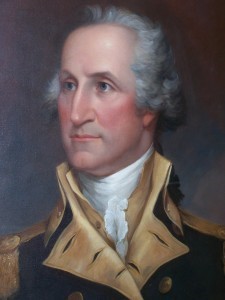
The great commander of the revolution, first president of the United States; the “indispensable man.”
Challenges at home and abroad undermined national unity and Washington, sensitive and proud, quickly became sick at heart at the political squabbles, and attacks on his policies and character. During Adams’s inaugural he is supposed to have said to the incoming president, “Ay, I am fairly out, and you are fairly in! See which one of us will be the happiest!”
Essential to the American victory in the revolution and a strong unifying leader as president, his “Farewell Address” set a tone of international independence which Adams pledged to follow – and did. The French Revolutionary government for its part neither understood nor appreciated the new American policy of realpolitik. For the French, American independence could not have succeeded without their financial and military aid. The American position was straightforward: French support had come from monarchist France, and since monarchist France no longer existed (due to the revolution), and the monarch executed, no debt of gratitude (financial or otherwise) was owed by America to the new French government that had overthrown the crown.
The growing conflict between America and its former key ally would be the central challenge of Adams’s presidency. It would all devolve finally to one question: Can war with revolutionary France be averted?